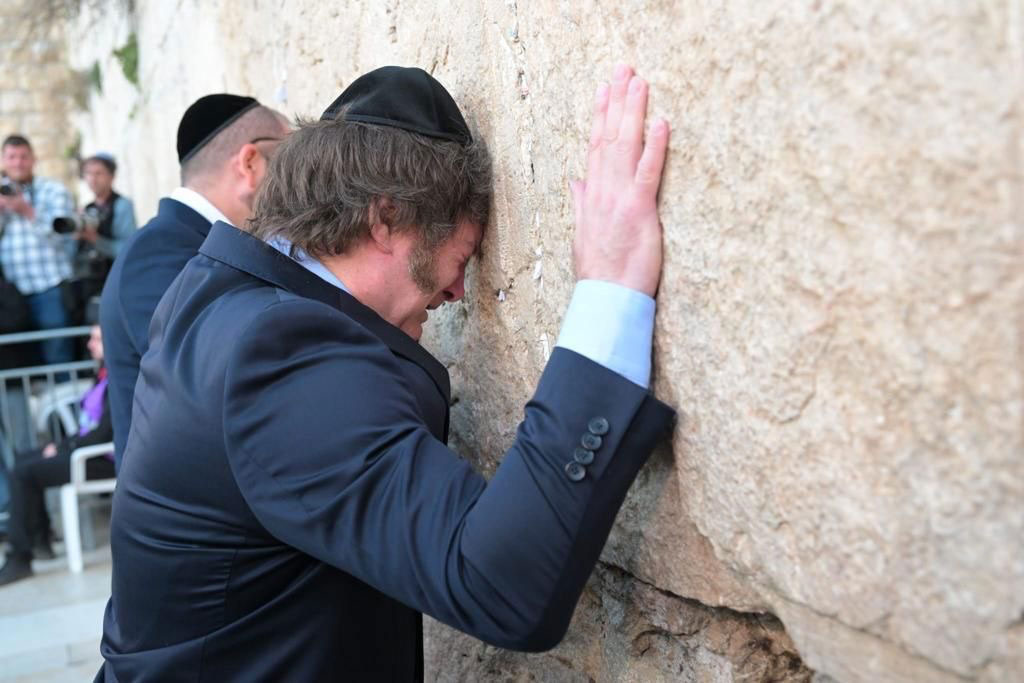Courtesy of JTA. Photo credit: Courtesy Israel Foreign Ministry
Argentinean President Javier Milei prays at the Western Wall in Jerusalem, Feb. 6, 2024
(JTA) — For the first time since its inauguration more than a decade ago, the prize dubbed the “Jewish Nobel” is going to a non-Jew: Javier Milei, the president of Argentina.
Milei’s selection marks another first for the Genesis Prize Foundation: the first prize given to a head of state, a departure for an award that has historically sought to sidestep politics.
Milei, a self-described “anarcho-capitalist” elected to lead Argentina in December 2023, has transformed Argentina from a critic of Israel to one of its staunchest supporters. He plans to move the embassy to Jerusalem and recently replaced his foreign minister after his first pick voted against Israel and the United States at the United Nations. Under his leadership, Argentina has declared Hamas a terrorist organization and ratcheted up efforts to prosecute those responsible for two deadly bombings against Jewish institutions in the 1990s.
Milei was raised Catholic but has also famously been drawn to Judaism and said he intends to convert once he leaves office. (He says it would be impossible to serve as president and observe Shabbat fully, a commitment that requires abstaining from work.) He studies regularly with a rabbi, Axel Wahnish, whom he appointed as his ambassador to Israel, and has cited Jewish stories and texts at multiple official events, including during his inauguration.
Milei joins a list of 12 Jews to have won the $1 million prize, which recipients traditionally donate to charity in a bid to fuel Jewish philanthrophy. Past winners include Steven Spielberg, Barbra Streisand and Natan Sharansky. Sharansky, who was imprisoned as a refusenik in the Soviet Union, is also a former Israeli politician, and the inaugural prize went to Mike Bloomberg months after he finished a 12-year tenure as New York City’s mayor. Six years after winning the prize, he unsuccessfully ran for the Democratic presidential nomination.
In recent years, the prize has also departed from its norm of honoring an individual by recognizing Jewish and Israeli nonprofits tackling crises and war in Ukraine and Israel.
Milei said in a statement released by the Genesis Prize Foundation that he would be donating his winnings to efforts to fight antisemitism.
“I am deeply honored to receive the Genesis Prize,” he said. “Of course, I will not keep the monetary prize; I will donate it to causes that support freedom and the fight against antisemitism, both in Argentina and around the world.”
The prize foundation’s president, Steven Rakitt, said the prize remains nonpolitical and that the foundation had chosen, at “one of the most difficult and increasingly isolated times in Israel’s history,” to lean into its mission of supporting Israel by rewarding an ally.
“It is important that non-Jews who are outspoken in their support for Jews and Israel be recognized,” he said by email. “We do not exclude honoring other prominent non-Jews who stand up for Israel or help combat antisemitism in the future.”
Rakitt said the foundation was considering holding its prize ceremony in Buenos Aires. Before last year, when Streisand was honored in Los Angeles, the ceremony has always taken place in Jerusalem.





